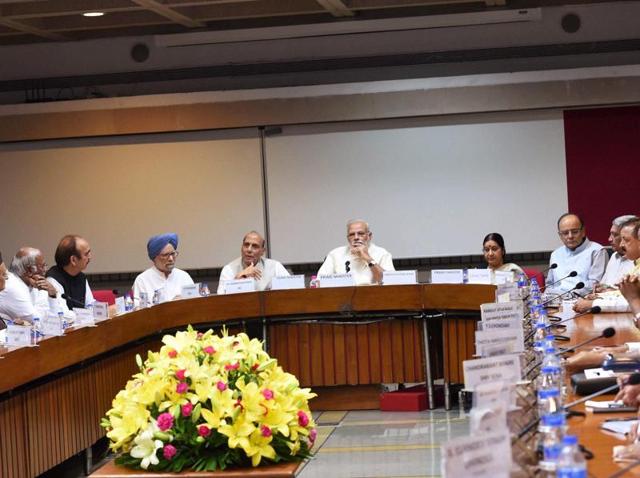Kashmir all-party meet: Modi discusses atrocities in PoK, Balochistan
The time has come to expose Pakistan’s brutalities on the people of Balochistan and Pak-occupied Kashmir (PoK), Prime Minister Narendra Modi said on Friday as the government launched a fresh offensive against Islamabad for fuelling the latest unrest in Kashmir.
The time has come to expose Pakistan’s brutalities in Balochistan and Pak-occupied Kashmir (PoK), Prime Minister Narendra Modi said on Friday, blaming cross-border terrorism for a violent phase in Kashmir that has left nearly 60 people dead since July.

Modi asked the external affairs ministry to contact expats from PoK to gather information about the “pitiable conditions” in the region and apprise the global community.
The PM’s comments at an all-party meeting to discuss the volatile situation in Kashmir are being seen as an escalation of rhetorical hostilities between the two countries over the violence in the Valley.
“Pakistan has forgotten that it bombards its own citizens from fighter planes,” Modi said in an apparent reference to Islamabad’s allegation of excesses by Indian security forces battling violent mobs in Kashmir since the killing of a Hizbul commander on July 8.
A section in the Indian establishment favours a counter-offensive by New Delhi over human rights violations in PoK and Balochistan, where Pakistan’s security forces are accused of extra-judicial killings in a crackdown on groups seeking greater autonomy for the resource-rich province.
Modi said the government will reach out to the Valley but added that Jammu, Ladakh and PoK should also be talked about in the same breath when discussing Kashmir, underlining the government’s approach of taking care of the entire state and not just one region.
While Modi said the government was ready to “talk to all” in Kashmir, finance minister Arun Jaitley told reporters later that a decision to engage with the separatist Hurriyat will be taken “keeping in view the prevailing circumstance.”
Home minister Rajnath Singh told the meeting that an all-party delegation to the Kashmir will be considered “after grounds were prepared in consultation with chief minister Mehbooba Mufti”.
All the parties barring the Shiv Sena favoured a ban on the use of pellet guns, which have injured a large number of civilians including children. Many of them have lost partial or full eyesight.
CPI (M) leader Sitaram Yechury and some others sought lifting the Armed Forces (Special Powers) Act, which gives unfettered powers to security forces, from civilian areas in the Valley.
Read| All-party delegations to commissions: Delhi’s attempt to engage with Kashmir
Former Prime Minister Manmohan Singh, who was the first to speak, said the UPA government made “sincere efforts” for a practical and pragmatic solution to the problem but failed.
The government should be seen as “caring”, he said.
External affairs minister Sushma Swaraj informed that the UN Human Rights Commission (UNHRC) has sought a visit to Kashmir but added that India will not allow interference in its internal matters.
The home minister said he had called up National Conference leader Omar Abdullah to invite him to the meeting, but the former chief minister expressed his inability citing time constraints. NC was unrepresented in the meeting.
AIMIM leader Asaduddin Owaisi said that curfew -- which completed 35 days on Friday -- was hindering normalisation of the situation and demanded fixing “accountability” against those responsible for deterioration of the situation.
TDP’s YS Chowdhury floated the idea of using drones to keep a tab on trouble-makers in Kashmir.
Muzaffar Hussain Baig, a leader of the ruling PDP, said the unrest was different from 2010 when too the state had seen days of violence on the streets of Srinagar.
“People from rural areas coming to the streets,” he said.
Read| Like the 2010 all-party delegation, will this one soothe Kashmir unrest?
Get Current Updates on India News, Ram Navami Live Updates , Lok Sabha Election 2024 live, Elections 2024, Election 2024 Date along with Latest News and Top Headlines from India and around the world.



